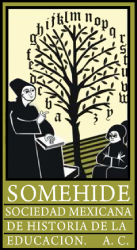Historia de la educación en la formación del psicopedagogo
DOI:
https://doi.org/10.29351/amhe.v1i1.244Palabras clave:
Aprendizaje, conocimiento, cultura, pasado, psicopedagogíaResumen
Para este artículo se realizó una investigación de enfoque cualitativo en la que se presentan las afirmaciones de un grupo de estudiantes de psicopedagogía y para la interpretación de la información obtenida se presenta desde el nivel descriptivo aportando ideas relacionadas con la importancia de la Historia de la educación como asignatura en el plan de estudios de los estudiantes. El objetivo del estudio se relacionó con saber cuáles son las afectaciones de la historia de la educación en la formación de los estudiantes de psicopedagogía. La historia como conjunto de conocimientos relacionados con el pasado y continuación del presente es una asignatura interesante y factible de impartirse en la carrera de psicopedagogía, solidariza al individuo con sus orígenes y contribuye a que sea un sujeto más social en la comprensión de su pasado. Para los mexicanos, conocer la historia de la educación que han recibido permite comprender las causas y consecuencias del estado actual de la educación que reciben, relacionado a los aspectos culturales y sociales por los que la sociedad mexicana ha transitado.
Citas
Coll, C. (1997). Aprendizaje escolar y construcción del conocimiento. México: Paidós.
Díaz Barriga, A. F. (1998). Una aportación a la didáctica de la historia, La enseñanza-aprendizaje de habilidades cognitivas en el bachillerato. Perfiles Educativos, (82). Recuperado de: http://www.redalyc.org/articulo.oa?id=13208204, 4 de enero de 2017.
Gottlieb, J. (2011). El destino del hombre. España: Ediciones Sígueme.
Heidegger, M. (2015). El ser y el tiempo. México: Fondo de Cultura Económica.
Latapí, P. (2004). La investigación educativa en México. México. Fondo de Cultura Económica.
Pérez Porto, J. (2008). Definición de psicopedagogía. Recuperado de: http://definicion.de/psicopedagogia/.
Popper, K. (2000). La sociedad abierta y sus enemigos. España: Paidós.
Sartre, J. P. (2013). El ser y la nada. España: Editorial Losada.
Suárez, R. (2014). La educación. Estrategias de enseñanza aprendizaje. Teorías educativas, México: Trillas.
Supo, J. (2014), Seminarios de investigación científica: Sinopsis del libro y carpeta de aprendizaje. Perú: Bioestadistico Eirl.
Viñao, A. (2002). La historia de la educación en el siglo XX. Una mirada desde España. Revista Mexicana de Investigación Educativa, 7(15), 223-256. Recuperado de: http://www.comie.org.mx/v1/revista/visualizador.php?articulo=ART00340&criterio=http://www.comie.org.mx/documentos/rmie/v07/n015/pdf/rmiev07n15scB02n01es.pdf.
Zea, L. (2015). Filosofía de la historia americana. Obras escogidas II. México: UNAM.
Descargas
Publicado
Cómo citar
Número
Sección
Licencia
Todos los contenidos del Anuario Mexicano de Historia de la Educación se publican bajo una licencia Creative Commons Atribución No Comercial 4.0 Internacional (CC BY-NC 4.0), que permite compartir (copiar y redistribuir el material en cualquier medio o formato) y adaptar (remezclar, transformar y construir a partir del material) para fines no comerciales, dando los créditos a los autores y a la revista, tal como lo establece la licencia.
La política de acceso abierto y de licencias con “algunos derechos reservados” no niega la propiedad intelectual ni los derechos de los autores respecto a sus artículos, pues ellos son los titulares, en tanto que el Anuario Mexicano de Historia de la Educación no los reserva para sí ni para la institución editora, ya que se apegan a movimientos de acceso abierto como los Principios y Valores del Sistema de Información Científica Redalyc - Red de Revistas Científicas de América Latina y el Caribe, que pugnan por la eliminación de las políticas de embargo para que el autor retenga los derechos de su obra (principio número 8). Así como las políticas de acceso abierto del Directory of Open Access Journals (DOAJ).
Los autores podrán distribuir su propio material en cualquier otro medio o soporte, siempre y cuando sea para fines no comerciales, informando a los editores que el trabajo será publicado nuevamente y dando el crédito correspondiente al Anuario Mexicano de Historia de la Educación.
La publicación en el Anuario Mexicano de Historia de la Educación, por su carácter gratuito, no da derecho a remuneración económica alguna a los autores, ni a los dictaminadores.
Los lectores podrán reproducir (copiar), comunicar, distribuir o hacer obras derivadas de los artículos o colaboraciones publicados en el Anuario Mexicano de Historia de la Educación en los siguientes casos:
- Para fines públicos.
- Sin fines comerciales.
- Que se reconozca la autoría de la obra y se cite su origen con información completa: Apellido/s del autor, inicial/es del nombre/s. (año de publicación). Título del artículo. Nombre de la revista, volumen (número de ejemplar), página inicial del artículo-página final del artículo. DOI o URL (formato sugerido de acuerdo al estilo APA en su versión más reciente).
El cuerpo editorial del Anuario Mexicano de Historia de la Educación asumirá el compromiso de notificar oportunamente a los autores sobre cualquier cambio de ubicación de los artículos en el sitio (cambio de dirección URL o de conexiones para identificar el artículo).
Los autores, al enviar sus trabajos para su posible publicación, deberán tomar en cuenta los puntos anteriores, mismos que se contemplan en el Acuerdo entre autor y el Anuario Mexicano de Historia de la Educación.











